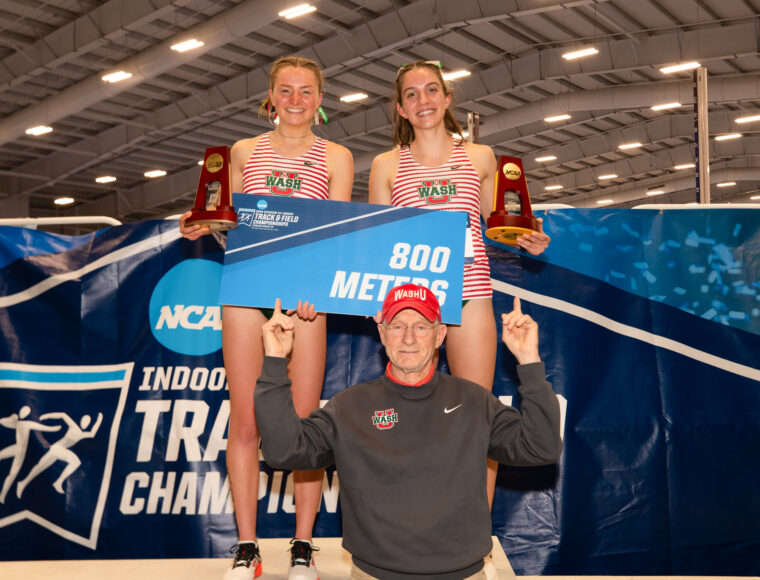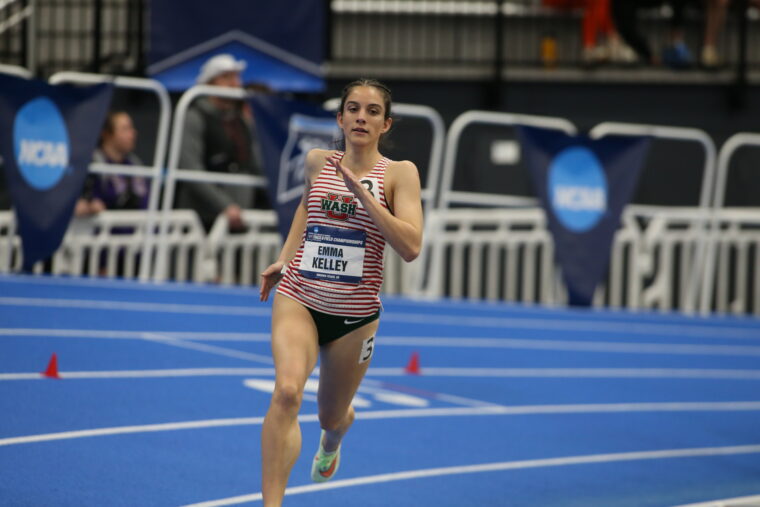Sports | Sports Feature | Track and Field
“Training on the numbers”: How WashU track turned its women’s 400/800 program into a national powerhouse

Seniors Emma Kelley (right) and Ally Sarussi (left) pose with assistant coach Gordon Reiter after all-American performances at indoor nationals. (Courtesy of WashU Athletics)
Washington University senior Emma Kelley has been shaving off seconds from her indoor 800m time for four years. Five seconds between her freshman and sophomore year. Three between her sophomore and junior season. And finally at the 2024 Division III Indoor Track & Field Championship, she set her final personal record in the indoor event — 2:04.13, the fastest time in Division III history. That time would have made her the eighth-fastest woman at this year’s Division I Championships.
“It was really exciting to run the best-feeling race in my life and cross the line and see that I had gotten that [record],” she said. “I think what made it even more special was having all my teammates there to share the moment with, and I had [senior] Ally Sarussi, my teammate, who finished right behind me in fourth.”
During the 2024 indoor track season, times set by Kelley, Sarussi, and graduate student Danielle Schultz made the WashU trio three of the 15 fastest runners in the 800 in all of Division III. The five fastest times this indoor season were all set by Kelley. Their success is emblematic of over a decade of dominance by the WashU track & field team’s women’s 400/800 meter training group. Since head coach Jeff Stiles brought in Gordon Reiter to lead the group over 11 years ago, the program has produced countless All-Americans and national champions.
After retiring as the head coach at Missouri Baptist University in 2012, Reiter joined Stiles’ program to coach the 400/800 group, more specifically coming in to train a new recruit, Emily Warner. Warner would go on to place first in the 4x400m relay and fourth in the 800m at the 2016 NCAA Division III National Championships. She was the first of many WashU athletes who Reiter — who was named the USTFCCCA National Women’s Track and Field Assistant Coach of the Year this winter — coached to a national-championship level.
Many of those standout athletes have gone on to thrive at the Division I level using their COVID year of eligibility. Aoife Dunne trained under Reiter for four years before going on to use her last year of eligibility at Boston College.
During her senior year, Dunne ran the 1,600m leg of the distance medley relay, which won the 2023 Division III Indoor National Championship. She now runs on the school-record-setting DMR for Boston College, which placed third at the Atlantic Coast Conference (ACC) Indoor Championship and ninth at the NCAA Division I Championships this winter. Dunne’s training under Reiter gave her the confidence to transfer from the 400m and 800m run to the longer 1,600m leg of the DMR her senior year at WashU.
“I ran the mile leg in the DMR, and I think when we won during the race, I was feeling really good. I had the feeling of, ‘Holy cow, I have the best coach in the world,’ because I just felt so confident,” Dunne said.

WashU’s 2023 DMR team, which included Sarussi and Dunne, finished first at indoor nationals. (Kyle Lauff | D3glorydays.com)
At the 2024 University Athletic Association (UAA) Outdoor Championship on April 28, Kelley accomplished a historic feat by winning the 400m and 800m run, two events separated by only 30 minutes. She won the events with times of 54.54 seconds and 2:08.49, both of which are UAA records. At the UAA meet, where the Bears took home their seventh-straight conference championship, four WashU runners — Kelley, Schultz, junior Izzy Gorton, and first-year Caroline Echols — took the top four spots in the 800m, and the team of Schultz, Echols, Gorton, and Sarussi set a new conference record in the 4x800m relay.
College runners only get four years to compete on the track, or in some cases five, due to COVID-19 eligibility changes. While each year is important, Reiter’s focus is on developing athletes for their final season, whether that be as a senior in St. Louis or a graduate student at the Division I level — like Dunne and Kelley, who will run at the University of Wisconsin next year.
“If I write a workout and they understand why they’re doing it, then they’re being prepared to do it their final season, and they do it for four years here, or however long they’re here,” Reiter said. “If they get a chance to have their final season at Division I, the results of doing [their training at WashU] right makes the DI schools look at them and look for them.”
This groundwork played a role in Kelley’s decision to use her fifth year of eligibility at the Division I level, a step she felt prepared to make after running for WashU over the last four years.
“I was looking at going DI just to get that experience for a year, and now with my four years [at WashU], I’m confident in my ability to compete at that higher level, and I know that everything that I’ve done here with Coach Reiter has definitely prepared me for that,” she said.

Stiles watches the 2021 800m group, which included Kelley (far left) and Dunne (far right). (Curran Neenan | Student Life)
The consistent success of the individuals and the group has been a product of their buy-in to their training. The close-knit group has embraced the challenges that come every day.
“They’re really, really close,” Reiter said. “They take pride in that [400/800] group. They do. They like going to practice. They absolutely dislike missing practice for anything.”
Kelley has not missed a single practice over the last four years with the team, something both Stiles and Reiter point to when talking about her immense success running for the Bears.
“You can’t put into words what Emma Kelley has done, because it’s never been done,” Stiles said. “I’m not talking about track, I’m just talking about [her dedication], just always being there. ‘Always’ isn’t an exaggeration, but ‘always’ is an accurate adjective.”
While any group of people who spend countless hours together each week has the opportunity to become close, what separates the 400/800 group is their dedication to each other both on and off the track, leading, as Reiter described, “by example” and embracing and acting as role models for new members of the group each year.
The consistent dedication and elite performances of the program’s runners have helped create a culture of success, where runners push each other to go faster at practice and on the track.
“On the team, we have this motto: iron sharpens iron. And that couldn’t have been more true, because [Kelley] made me so much better,” Dunne said about training with Kelley and the WashU program.

After four years at WashU, Kelley plans to run at the University of Wisconsin next year. (Courtesy of WashU Athletics)
Alongside the team’s incredible performance on the track, they have built a culture akin to a family, sharing meals together after practice, helping each other with class, or drinking Reiter’s homemade apple cider after a challenging workout.
When Dunne stepped on campus during her senior year of high school, the 400/800 group’s close connection quickly became evident, playing an important role in her decision to attend WashU.
“You could tell from the two days that I was there that people cared so much about each other,” she said. “It was just like this big family.”
For Echols, the supportive coaching staff and team culture drew her to both WashU and the program more specifically.
“From the moment I first visited WashU, everyone on the team was so welcoming and nice,” she said. “Our team has such an amazing culture, unlike anywhere else, and everyone here is so supportive and wants everyone on the team to succeed.”
The group trains with a mentality Stiles describes as “training on the numbers,” with the group’s most intense workouts at near-race-pace with relatively short rests.
Reiter focuses his training on two things: simulating race conditions and getting his runners to compete in the UAA and NCAA Championships, or as he calls it, “the big show.”
Throughout the week, Reiter explains the reasoning and purpose behind each workout, which he has been honing over the last 11 years in an attitude Stiles describes as “fail[ing] forward.”
“Gordon just continues to fail forward — like taking workouts that went great, workouts that didn’t, and just kind of sprinkling in the pixie dust as he continues to refine it. I look at what he’s done over the years, and it’s changed quite a bit.”

The woman’s track and field team finished second at indoor nationals in March. (Courtesy of WashU Athletics)
For the group, every week of training begins on Sunday, when they receive that week’s workouts. The intensity varies day to day, with Monday usually being the most taxing. “It’s a harder workout,” Reiter said. “We’re expecting faster times with less rest, which makes it challenging. I like to have them really feel what it’s going to feel like in a race.”
Compared to some mid-distance programs that place a heavier emphasis on racking up high mileage, the 400/800 group focuses on speed and sprint work.
“We do a lot of speed work and a lot of track work, which I think is part of why it works so well for me,” Kelley said. “We are still getting a lot of shorter workouts and sprint work, combined with just enough mileage to keep up endurance for an 800, and it works really well.”
Kelley’s impact on the WashU track program and 400/800 training group extends far beyond her three national championships, her NCAA and UAA records, and her All-American finishes. Her dedication to the program — which she describes as “one of the best experiences of my four years in college” — has continued to raise a standard of excellence that has trickled down through generations of WashU runners.
Even after graduating, the memories and lessons taken from their time with the 400/800 group have stuck with runners — including Dunne, who considers Reiter one of the five most important figures not just during her time at WashU, but in her life.
“It sounds so cliche, but he really changed my life, and I think everyone that’s been in the 400/800 group has so much love for that man. We all run because you want to make Reiter proud,” she said.
For Reiter, what makes the program special goes far beyond him. It is the runners and their extraordinary level of dedication to their training, their teammates, and the entire track team.
“They buy into what we’re doing here,” Reiter said. “They buy into what Washington University track and field looks like, and so I’ll say it this way: I feel very fortunate that they let me work with these kids.”
